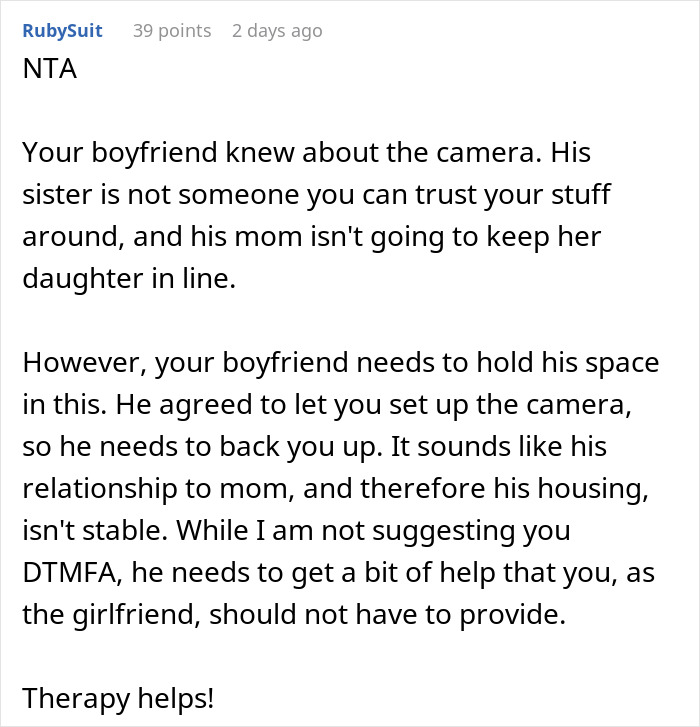It’s not without reason that the saying “When you marry someone, you marry their family” is so common. Even though these words may prompt an eye roll from some people, there’s a lot of truth in them. Whether the couple just started dating, is in a serious relationship, got engaged, or is already married, their parents and siblings are bound to be involved in their relationship and even have an impact on it—for better or for worse.
This woman seemed to be getting along fine with her boyfriend’s family until she noticed that his sister was taking things from her. To address this issue, she first decided to get some proof beforehand. After she succeeded, she confronted the sibling, but it definitely didn’t go as she expected.
Whether the relationship is new or long-term, partners’ families are bound to be involved in it

Image credits: Meg Aghamyan (not the actual photo)
This woman seemed unfazed by this fact, until her boyfriend’s sister started taking things from her











Image credits: Jakub Żerdzicki (not the actual photo)




Image source: Adhdprincesspeach
75% of couples experienced problems with an in-law

Image credits: Curated Lifestyle (not the actual photo)
Most people don’t go into a relationship expecting to have difficulties with their partner’s parents or siblings. However, gaining a new family isn’t always as smooth as one hopes for. A US study from 2022 found that both men and women tend to have more conflicts with their partner’s side of the family than their own. Meanwhile, 2008 findings reported that 75% of couples experienced problems with an in-law.
Partially why in-law relationships can be tricky is because there’s no guide to follow when navigating them. There are many uncertainties when it comes to particular scenarios, like how close they should live next to each other, how often they should see each other, and what responsibilities they might share—with no concrete answer to them. While with family it’s more likely that one has more common ground and interests, the overlap in common agreement with in-laws is smaller.
The relationship that is especially tricky among in-law family dynamics is between a female spouse and her sister-in-law. Even though sisterly bonds are known to be strong and special, this isn’t often the case with these two family members.
“The sister-in-law dynamic can be challenging for a variety of psychological and social reasons, instilling feelings of jealousy and competitiveness,” says relationship therapist and mental health expert Sophie Cress. “Sisters-in-law may come from various families, each with their own set of values, customs, and expectations. These differences can lead to misunderstandings and stress.”
“Unlike relationships with parents-in-law, sister-in-law relationships can be more ambiguous and fluid, making them difficult to negotiate,” she says. “Sisters-in-law may also find themselves in direct rivalry for duties within the family, such as hosting holidays or becoming the major confidante of a shared sister, which can aggravate tensions. Gender relations also play a role. Women are frequently raised to value relationships and family harmony, which might increase sensitivity and emotional responses in these encounters.”
In-law relationships aren’t always a lost cause

Image credits: Stephanie Berbec (not the actual photo)
The good news is that the in-law relationships aren’t always a lost cause. If you fell to the more difficult spectrum in your partner’s family, try to address the matter with empathy and open communication. At least that’s what Cress suggests doing for sister-in-laws.
“Begin by trying to comprehend her point of view and the reasons for her actions,” she says. “A simple talk can often uncover misunderstandings and clarify the air. Express yourself honestly and respectfully, using ‘I’ phrases to avoid seeming accusatory.”
Setting boundaries is also important when trying to manage in-law dynamics. “Determine what behaviours are acceptable to you and what you are willing to tolerate, and communicate these boundaries clearly,” Cress advises. “At the same time, make an effort to build a positive relationship by finding common interests and spending quality time together. Showing appreciation and acknowledging her positive qualities can also help shift the dynamic to a more positive one. Remember, patience and consistency are key; changing relationship dynamics takes time.”
If there’s no way to reach a harmonious relationship, the only thing left is to control how you react to issues that arise. If the behavior of an in-law starts to work you up, try to breathe and respond in a relaxed way without escalating the situation further. The only thing that matters is to preserve your relationship with your partner by upholding respectable bonds with their family, even though they might not be close ones.
The woman provided more infomation in the comments









Some readers were on her side













While others had a different perspective






















 English (US) ·
English (US) ·